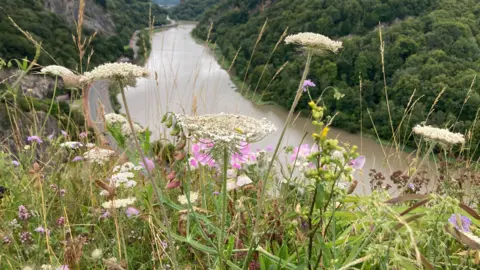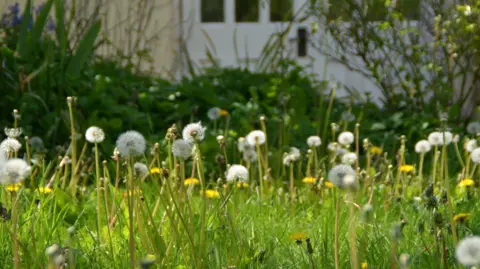People urged not to mow their gardens this May
 BBC
BBCWildlife trusts and environmental charities are joining calls for people to take part in No Mow May.
The campaign urges gardeners to avoid mowing their lawns to give pollinators, such as bees and butterflies, a boost by allowing wildflowers to thrive.
Avon Wildlife Trust and nature protection charity, Plantlife, are amongst the organisations supporting the annual campaign.
Stuart McArthy-Thompson, from Avon Wildlife Trust, said: "We've got 23 million gardens in the UK so it's a really important habitat for insects and pollinators."
"Over time the grasses will get longer and it will provide more of a habitat for insects that will in turn bring more things to the garden," he said.
May is an important time as it is when a lot of birds are looking for food and preparing to build nests.
 PA
PA"It's not just bees, we're looking to host a whole variety of invertebrate that need our longer grass to sustain their lifecycles and feed our birds," said Mark Schofield, road verges adviser to Plantlife.
"By reducing mowing you could produce up to ten times more nectar for insects and the 270 types of bee in the UK," he added.
Plantlife are currently running a campaign aiming to educate people about the importance of some wildflowers which are commonly considered weeds.
They said dandelions are a prime example - with roughly six dandelions needed to support a bumblebee.
No lawn needed
Mr McArthy-Thompson said there are plenty of ways for those who do not have access to a lawn to help pollinators.
"Wildflowers in pots are a great way for pollinators to benefit and doesn't take much knowledge or skill," he said.
He also suggested planting Common Knapweed and Common Bird's-Foot-Trefoil, which, he said, will grow quickly and do not take up much space.
While decorative flowers such as roses and dahlias are also useful to pollinators, indigenous wildflowers are seen as the best for native pollinators, he added.
